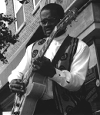|
|
||||||||||||||
|
Fred Woodard: InterviewON THE RISE
These days, most jazz guitarists tend ot start out playing the simple cadences and riffs of blues or rock, and only later master the complex chord structures and challenging techniques necessary for be-bop. Not Fred Woodard. He did it backwards. "When I went to Berklee, I was 18 and just out of high school," he says. "I had played a lot of jazz and funk, but I hadn't had a lot of real world experience." He eagerly fed himself into the efficient Berklee College educational machine, studied ear training, harmony and advanced playing styles, and four years later emerged as a stellar jazz player in the mold of George Benson. His playing was undeniably note-perfect, but still, something was missing. It all became clear to him when he finally heard the music of B.B. King. "I knew that the blues was really important, and I hadn't studied the blues at Berklee," says Woodard, now 39. So he set out to give himself a crash course in what he had missed. He studied blues history, listened voraciously, and played whenever he could at blues jams. He applied all the academic skills he had acquired in college to the task. "Because of what I'd learned, I was really able to analyze the blues," he says. "I was able to draw parallels between the playing of B.B. King and George Benson. I took these things and combined them with what I'd been doing." As a result, Woodard created for himself a newer, grittier approach to playing jazz. Without any amplifier distortion to muddy the sound, his warm, jazz-seasoned tone dances blithely around the blues grace notes, always grounded in raw simplicity. As a songwriter, the gut-simple yet strangely off-kilter melody of a tune like "Arrival" (the title cut from his new self-released CD) brings to mind the fractured simplicity of pianist/composer Thelonious Monk. For Woodard, though, the educational process continues. He plays whenever he can at clubs such as Estelle's and Ryles, and believes jazz needs small clubs and appreciative audiences to continue to evolve. "You learn things from the other players," he says, "But lots of club owners don't seem to want to take a chance on jazz anymore. It is more about making money, so there are less places to play. Without jazz clubs, musicians have to learn the craft through universities, and jazz can become more of an academic thing." But not for Woodard. He intends to continue improving his playing and collecting experiences out in the real world as long as he can find clubs to play in. "I want to try to master my instrument, because it is a lifelong journey to be a jazz musician," he says, "But I also want to always make sure to keep something in my playing that the common man would understand." -David Wildman (Boston Sunday Globe, April 16, 2000) |
|||||||||||||
|
| Home | Biography | Discography
| Reviews | Interviews | Ujam Records P.O. Box 190586, Roxbury, MA 02119 Phone: 617-631-2480 email: [email protected] |
||||||||||||||



